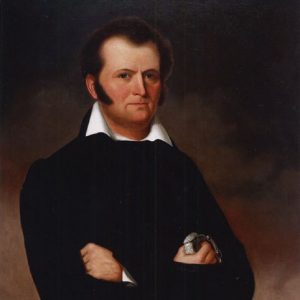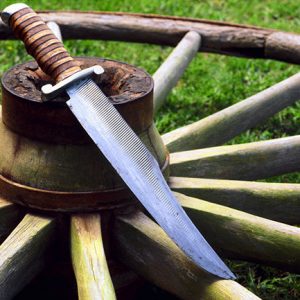calsfoundation@cals.org
Jim Bowie (1796–1836)
aka: James Bowie
Jim Bowie, the man who popularized the bowie knife and who served as the co-commander of the Texan forces at the Alamo, was also an adventurer and land speculator who achieved notoriety for a number of fraudulent land claims he made in Arkansas.
Little is known about Bowie’s birth. His father was Rezin Bowie and his mother Alvina Jones (Elve) Bowie. Their son Jim was most likely born in Logan County, Kentucky, although some accounts place his birth in Tennessee or Georgia. Bowie had numerous brothers and sisters, and two of his brothers, Rezin P. and John, each owned property in Arkansas in Chicot County and Helena (Phillips County) during their lives. It is believed that John Bowie is buried in Desha County.
The Bowie family moved to Louisiana when Jim was about six. It was there that he developed his spirit of adventure and was reported to have ridden alligators for sport. In 1818, Bowie and his brother Rezin P. were introduced to the pirate Jean Lafitte. Bowie soon partnered with Lafitte in illegally importing slaves by smuggling them from Texas, which was not then part of the United States, into Louisiana. With the money earned in the slave trade, Bowie began to speculate in Louisiana land, buying undeveloped tracts of land and then selling them when an opportunity presented itself. Many of Bowie’s land claims were fraudulent, and he and his brother John left Louisiana under a cloud of suspicion and moved north into Arkansas, where they soon launched another land speculation scheme.
In 1827, the Superior Court in Little Rock (Pulaski County) received 126 claims for confirmation, and practically all of the Bowie land claims were confirmed. United States Deputy Attorney General Samuel J. Doane suspected fraud and appealed the case, and in 1831, the Arkansas court, ruling that witnesses in the first trial had been bribed, changed its ruling to find that the claims of the Bowies were fraudulent. The case was heard in the United States Supreme Court, which in Sampreyac and Stewart v. the United States threw out all of the Bowie claims. Bowie was never held accountable for these frauds, as he was not specifically named in the court documents.
Like many events in Bowie’s life, the circumstances surrounding the invention of the bowie knife in the 1820s are not clear. One claim holds that Bowie himself designed the knife, which features a large butcher knife-like blade with a curve near the point, along with a guard at the base of the handle to prevent the hand from slipping onto the blade. Some sources claim that Bowie’s brother Rezin P. designed the knife, though still others hold that the knife was invented by Washington (Hempstead County) blacksmith James Black. It is possible, if not likely, that the bowie knife was not invented at all but simply developed over time.
Bowie moved to Texas in 1828. In April 1831, he married Ursala Maria de Veramendi, the daughter of the vice governor, though their marriage lasted barely two years, as she died of cholera in 1833. In a statement of worth to Ursula’s father, Bowie fraudulently listed land in Arkansas valued at $30,000.
By 1834, Bowie was again engaged in land speculation, this time in Texas. When conflict broke out in 1835 between independence-minded Anglo Americans and Mexicans in Texas and those supporting the Mexican government, Bowie quickly sided with the Texans. He participated in two minor battles and several skirmishes before being stricken with typhoid at the Alamo, where he served as commander of the volunteer forces of the garrison. Bowie was unable to participate in the Battle of the Alamo due to his illness and was shot and killed when the Mexican Army stormed the compound on March 6, 1836.
For additional information:
Baugh, Virgil E. Rendezvous at the Alamo: Highlights in the Lives of Bowie, Crockett, and Travis. Lincoln: University of Nebraska Press, 1985.
Burrough, Bryan, Chris Tomlinson, and Jason Stanford. Forget the Alamo: The Rise and Fall of an American Myth. New York: Penguin Press, 2021.
Davis, William C. Three Roads to the Alamo: The Lives and Fortunes of David Crockett, James Bowie, and William Barrett Travis. New York: HarperCollins Publishers, 1998.
Hopewell, Clifford. James Bowie, Texas Fighting Man: A Biography. Austin: Eakin Press, 1994.
Jeff Bailey
Arkansas State University








Comments
No comments on this entry yet.